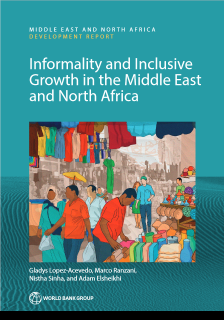
The long-standing informality debate in the Middle East and North Africa (MENA) region has taken on a new urgency as it looks for a pathway to more socially inclusive growth that is less reliant on fossil fuels. This is occurring against a backdrop of subpar labour market outcomes, further growth setbacks, and deteriorating fiscal and current account deficits in the aftermath of the COVID-19 pandemic, and in the wake of high inflation and supply chain disruptions triggered by the Russian–Ukraine conflict.
This report aims to better understand the characteristics and incentive structure that have led to the prevalence of informal employment in three MENA countries -- Egypt, Morocco and Tunisia. It breaks new ground by adopting a comprehensive perspective to focus on the features of, and interrelationships among, different aspects of these countries’ institutional landscapes to make sense of the complex incentive structure that workers and firms face when deciding between formal and informal options.
Specifically, the report groups these issues in three broad realms: entrepreneur-worker relations, taxes and transfers, and market conditions.
